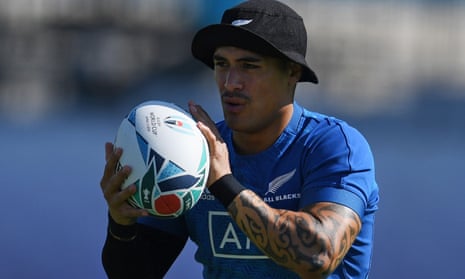The All Blacks are gamely braving Japan’s humidity and covering up their considerable collection of tattoos as they prepare for their defence of the Rugby World Cup at the weekend.
The All Blacks, who have a huge following in Japan, are covering up so as not to fall foul of local cultural sensitivities about public displays of body ink.
Despite the growing popularity of fashion tattoos in Japan, many people associate them with membership of the yakuza – the country’s network of crime syndicates.
The players have been covering up in onsen hot springs, hotel lobbies and other places where they are likely to encounter the public.
“We have got an onsen, like a spa, in every hotel and in Kashiwa that spa was a public one and we had to wear skivvies [long-sleeved tops] or tights,” star halfback Aaron Smith said of the team’s training camp near Tokyo.
Smith said he and his teammates were happy to conceal their tattoos to avoid causing offence. “And that’s OK. We are in Japan, you have to embrace their way, their culture. And most people with tattoos were happy to cover up,” the New Zealand Herald quoted him as saying.
Samoa’s players too, have said they will hide their tattoos with skin suits when they are not playing.
“There’s a lot of similarities in our cultures but when it comes to the tattoos we have obviously got a lot of tattoos, it’s quite normal in our culture,” the Samoan captain, Jack Lam, told the Herald.
“But we are respectful and mindful to what the Japanese way is. We will be making sure that what we are showing will be OK.”
Tattoos are commonplace in New Zealand, especially amongst the country’s Māori and Pacific Islands communities. Many All Blacks players have traditional inkings, known in Māori as Tā moko.
The ban on displaying tattoos ranks alongside beer shortages as two potential sources of embarrassment at the tournament, which opens on Friday when Japan play Russia at Tokyo Stadium.
But many onsen and other facilities that usually frown on tattoos have indicated they will take a more relaxed approach, as Japan prepares for the arrival of an estimated 400,000 overseas rugby fans.
Tourism officials near Sapporo, which will host England v Tonga on Saturday, said they would leave individual onsen owners to decide whether to admit tattooed bathers.
Oita prefecture, a region of south-west Japan famed for its hot springs, published English-language guidelines on onsen etiquette and an online map of dozens of facilities in the onsen towns of Beppu and Yufuin that will accept tattooed bathers during the six-week tournament.
Last September, World Rugby warned players and supporters to keep their tattoos covered when visiting gyms and pools to avoid causing offence. The guidelines will not apply to players during games, however.
The hotel near Tokyo where the All Blacks are staying at while they prepare for their opening match against South Africa in Yokohama on Saturday is happy for the players to show off tattoos on their arms and legs.
“It was only this hotel (that) don’t mind,” Smith said, according to Stuff.co.nz. “Every hotel we go to, we get a little message around that.”
The players have also had to adapt to the Japanese custom of not wearing shoes inside homes and some other buildings.
“The only other thing that is similar around the hotel is shoes,” Smith said. “The gym we go to today, we have got to take indoor shoes. The ones you walk to the gym in, you can’t wear in the gym.
“We just have to respect that and adapt as All Blacks. We are grateful to be here and we don’t want to act anything bigger than we are.”
Additional reporting by Angela Cuming
